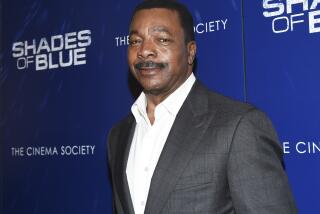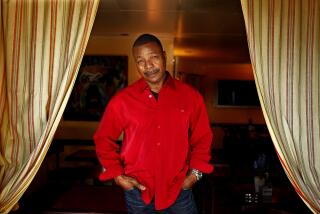Carl Anderson brought Judas to life
- Share via
It seems to me a strange thing, mystifying (to quote the show), that singer and actor Carl Anderson, whom audiences knew from the stage and screen versions of the 1970s rock opera “Jesus Christ Superstar,” died the same week Mel Gibson’s “The Passion of the Christ” arrived in movie theaters.
“Superstar” and “Passion” are wildly different takes on the death of Jesus, but both adhere to the prevailing rap on Judas Iscariot: He did what he had to do, and it drove him crazy. Judas’ suicide is a disturbing contrast to the Crucifixion, is always a sidebar, and yet it’s the scene that most haunts me in almost any Passion play.
Anderson, 58, died Feb. 23 in Los Angeles of leukemia.
By his estimation, he’d performed the part of Judas onstage more than 1,000 times. He also starred in Norman Jewison’s 1973 film version, and for a generation of viewers Anderson personified the fallen disciple, gave him dimension and made him more human than the traitorous demon he’d become over the centuries.
Anderson was born in Lynchburg, Va., one of 12 children, and sang in the school choir. While going to Howard University, he joined a rock band called Second Eagle, which had taken to performing songs from a new concept album, “Jesus Christ Superstar.” Producers of the upcoming Broadway production tried unsuccessfully to stop Anderson’s band from performing the songs at a Washington, D.C., church on Palm Sunday. Impressed by his voice, they wound up casting Anderson in 1971 as an understudy to Ben Vereen, who got the part of Judas. Eventually, Anderson took over the role.
And never really stopped. Although he got other roles onstage and on-screen, and had a couple of hit R&B; ballads, Anderson kept coming back to the part.
In fall 1994, a touring roadshow of “Jesus Christ Superstar” rolled into Albuquerque. I was assigned to interview Anderson, who was then 49 and still tying a rope around his neck and hanging himself onstage every night. We met in the morning at a radio station, where Anderson took calls from listeners who had urgent stories to tell him about what “Superstar” had meant to them. “This show has baggage,” he told me.
“There was a time, when I was younger and playing Judas, that I considered it a steppingstone to becoming a big star,” Anderson said that day. “I never took time to enjoy it back then. Now it’s a part of me. If I go down as the guy who was Judas ... OK, then. That’s fine.”
He was always encouraging people in the audience to come backstage. At the end of every performance of “Jesus Christ Superstar,” there were teary-eyed fans who desperately needed to talk to Jesus. But just as many of them had a powerful need to meet Judas too.
More to Read
The biggest entertainment stories
Get our big stories about Hollywood, film, television, music, arts, culture and more right in your inbox as soon as they publish.
You may occasionally receive promotional content from the Los Angeles Times.










